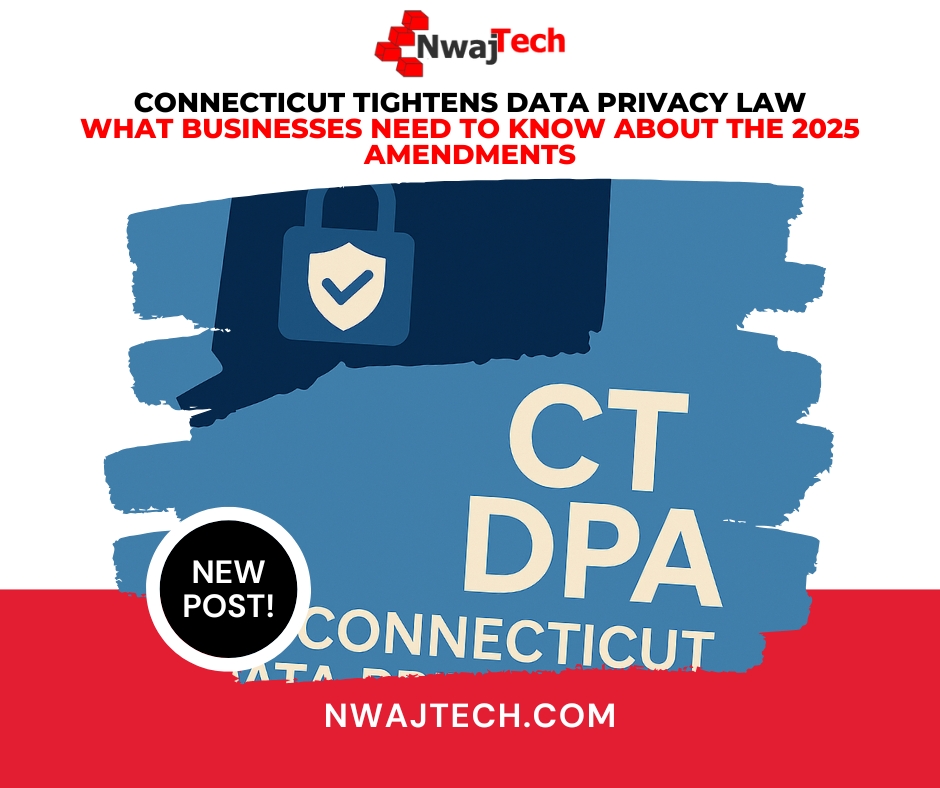Connecticut Tightens Data Privacy Law: What Businesses Need to Know About the 2025 Amendments to the CTPA
On June 25, 2025, Connecticut Governor Ned Lamont signed SB 1295, marking a significant update to the state’s Data Privacy Act (CTDPA). These amendments significantly expand the law’s scope and introduce stricter requirements for businesses and nonprofits that handle personal data. If your organization collects or processes personal information from Connecticut residents, these changes matter to you, whether you’re a large enterprise or a small firm.
Below, we break down the key updates, explain what they mean, and provide guidance on how to start preparing now.
Key Changes to the Connecticut Data Privacy Act
1. Lower Applicability Thresholds
Previously, the law only applied to organizations processing data from 100,000 residents. That threshold has now dropped to 35,000 residents—or roughly 0.95% of Connecticut’s population. This means many more small to mid-sized businesses and nonprofits now fall under the law’s jurisdiction.
2. Expanded Definition of Sensitive Data
Connecticut now leads the nation in defining what counts as “sensitive.” Additions include:
-
Neural data
-
Gender identity
-
Disability status
-
Biometric and genetic information
-
Government-issued IDs like driver’s licenses and Social Security numbers
If your organization collects any of this data, explicit consent and additional safeguards are now required.
Controllers must now ensure data collection is “reasonably necessary and proportionate” to their stated purposes. Any new use of collected data, outside its original purpose, may require renewed consent from consumers.
4. New Rules for Profiling and Automated Decisions
One of the most progressive aspects of the update involves AI and profiling:
-
Profiling that leads to legal, financial, or similar outcomes now requires impact assessments.
-
Consumers gain the right to opt out of profiling and challenge automated decisions.
These provisions mark Connecticut as one of the first states to meaningfully address the risks of AI and algorithmic bias in privacy legislation.
5. Tightened Exemptions
Broad exemptions for financial and public-sector organizations have been narrowed. Many entities that previously avoided compliance due to their sector may now be required to meet CTDPA obligations.
6. Enhanced Consumer Rights
The updates also clarify and strengthen consumer rights, including:
-
The right to access, correct, and delete data
-
New rules for how businesses must respond to requests
-
Deadlines and procedural requirements to ensure timely and fair processing
When Do These Changes Take Effect?
Most amendments will go into effect on July 1, 2026, giving businesses approximately one year to prepare.
However, enforcement resources at the Attorney General’s office have already been expanded, signaling a clear intent to hold organizations accountable.
What Should Your Business Do Now?
If you process any data from Connecticut residents, you should:
-
Review Your Applicability
Determine if you now meet the new threshold of 35,000 residents. -
Update Data Mapping and Inventories
Identify all sensitive data types now covered under the expanded definition. -
Revise Consent Mechanisms
Ensure that proper opt-in processes are in place for the collection and profiling of sensitive data. -
Assess AI and Automated Decision-Making Tools
Conduct and document impact assessments for profiling systems. -
Train Staff and Update Policies
Ensure internal teams understand the law’s expanded scope and procedural changes. -
Partner with a Privacy-First IT Provider
A managed service provider (MSP) or virtual CISO can help align your data practices with evolving legal requirements, without the high cost of a full legal team.
Final Thoughts
Connecticut’s latest update to its data privacy law is more than a compliance checkbox—it’s a reflection of rising expectations from both regulators and consumers. With the rise of AI, profiling, and cross-border data sharing, your business can no longer afford to treat data privacy as an afterthought.
If you’re unsure how these changes impact your business or how to get started, our team at Nwaj Tech can help assess your risk, guide your compliance strategy, and build a privacy-first IT environment.
Contact us today to schedule a free privacy and compliance readiness check.
📞 888.788.ZERO | 🌐 nwajtech.com | 📧 support@nwaj.tech

